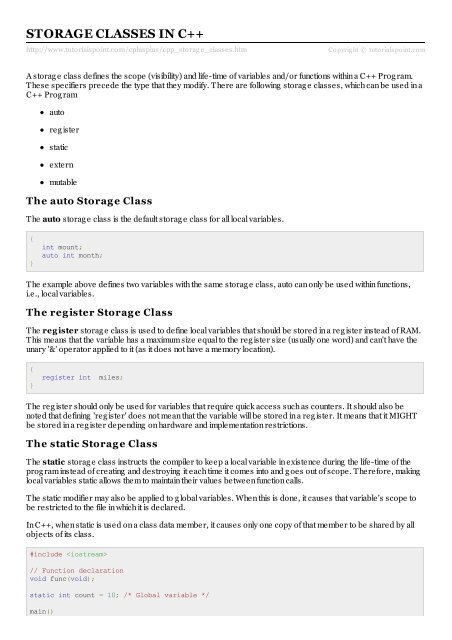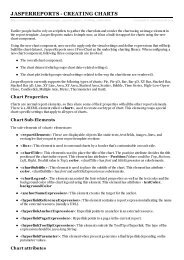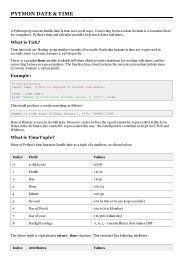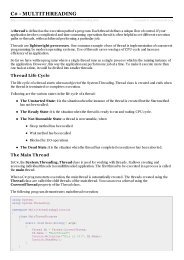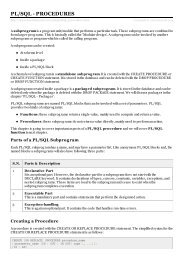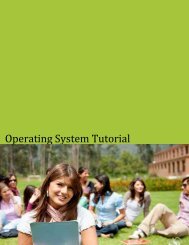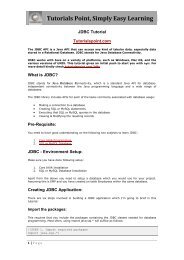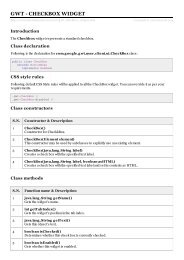You also want an ePaper? Increase the reach of your titles
YUMPU automatically turns print PDFs into web optimized ePapers that Google loves.
STORAGE CLASSES IN C++<br />
http://www.tuto rialspo int.co m/cplusplus/cpp_sto rag e_classes.htm<br />
Copyrig ht © tutorialspoint.com<br />
A storag e class defines the scope (visibility) and life-time of variables and/or functions within a C++ Prog ram.<br />
These specifiers precede the type that they modify. There are following storag e classes, which can be used in a<br />
C++ Prog ram<br />
auto<br />
reg ister<br />
static<br />
extern<br />
mutable<br />
The auto Storag e Class<br />
The auto storag e class is the default storag e class for all local variables.<br />
{<br />
}<br />
int mount;<br />
auto int month;<br />
The example above defines two variables with the same storag e class, auto can only be used within functions,<br />
i.e., local variables.<br />
The reg ister Storag e Class<br />
The reg ister storag e class is used to define local variables that should be stored in a reg ister instead of RAM.<br />
This means that the variable has a maximum size equal to the reg ister size (usually one word) and can't have the<br />
unary '&' operator applied to it (as it does not have a memory location).<br />
{<br />
}<br />
register int miles;<br />
The reg ister should only be used for variables that require quick access such as counters. It should also be<br />
noted that defining 'reg ister' does not mean that the variable will be stored in a reg ister. It means that it MIGHT<br />
be stored in a reg ister depending on hardware and implementation restrictions.<br />
The static Storag e Class<br />
The static storag e class instructs the compiler to keep a local variable in existence during the life-time of the<br />
prog ram instead of creating and destroying it each time it comes into and g oes out of scope. Therefore, making<br />
local variables static allows them to maintain their values between function calls.<br />
The static modifier may also be applied to g lobal variables. When this is done, it causes that variable's scope to<br />
be restricted to the file in which it is declared.<br />
In C++, when static is used on a class data member, it causes only one copy of that member to be shared by all<br />
objects of its class.<br />
#include <br />
// Function declaration<br />
void func(void);<br />
static int count = 10; /* Global variable */<br />
main()
{<br />
while(count--)<br />
{<br />
func();<br />
}<br />
return 0;<br />
}<br />
// Function definition<br />
void func( void )<br />
{<br />
static int i = 5; // local static variable<br />
i++;<br />
std::cout
$g++ main.cpp support.cpp -o write<br />
This will produce write executable prog ram, try to execute write and check the result as follows:<br />
$./write<br />
5<br />
The mutable Storag e Class<br />
The mutable specifier applies only to class objects, which are discussed later in this tutorial. It allows a member<br />
of an object to override constness. That is, a mutable member can be modified by a const member function.


